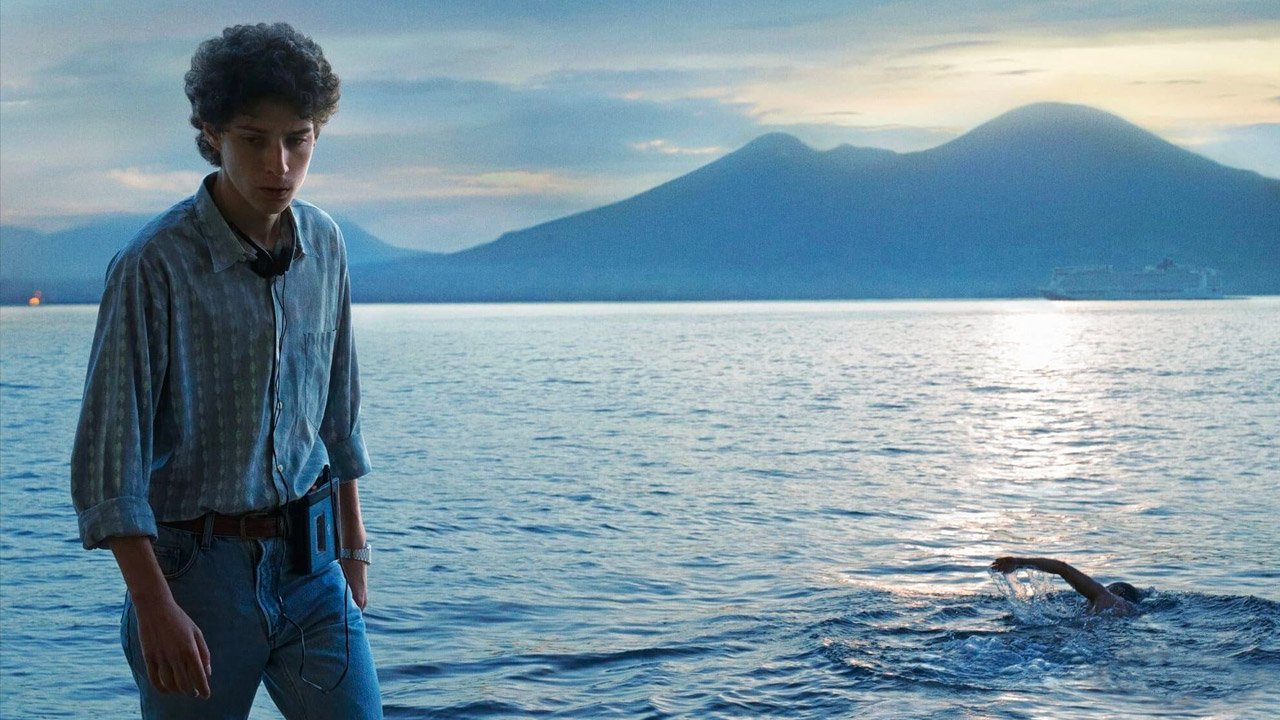DON’T COME UNDONE - Non ti disunire
Still frame from La Mano di Dio, by Paolo Sorrentino
“Is it possible that the city doesn’t inspire you at all? So, you got somethin’ to say? Or are you an asshole like everyone else? Got a story to tell? Have some guts! Got a story to tell or not? C’mon, you fool! Got a story to tell? Find the guts to tell it! C’mon! Got a story to tell?”
“Yes!”
“Then spit it out!”
“When my parents died they didn’t let me see them!”
“Don’t come undone, Fabio”. [NON TI DISUNIRE, FABIO]
“Everyone calls me Fabietto.”
“Time they start callin’ you Fabio. Don’t come undone.”
“What does that mean?”
“You gotta figure it out yourself. You gotta figure it out yourself, you piece of shit! Don’t come undone, Schisa! Don’t ever come undone! You can’t allow that.”
“What does it mean? Why?”
“Because they didn’t leave you alone.”
“No?”
“No! They abandoned you. Listen to me, don’t go to Rome. Come see me, I’m always here. We’ll make films together!”
We can neither allow nor avoid coming undone. It is not in our control, perhaps it is nel la mano di Dio.
We cannot avoid coming undone when our insides collapse. I wish we could allow it, but then we’d be our own enemy. Perhaps we can only become our own saviors, by leaving for Rome. Why? Because we come undone long before leaving.
What does it mean to come undone? Fabio must find out before choosing. Does he leave his Naples or remain in his land, anchored to beautiful fragile roots.
The blurring of descriptive capacity, together with the loss of speech, is disarming. When do we notice the tragedy behind our diverted roots? What saves us is the propensity to belong, what unsettles us is the loss of belonging. But this loss might save us twice over.
We are fragile humans who all eventually come undone. The deeper you can arrive withing your mind, the more you become inclined to observe. In observation, you can pleasure yourself with idiosyncratic visions of the world. The truer you see, the more you come undone when an event makes you stumble.
We come undone long before leaving. We cannot give light to what was supposed to enlighten us.
What happens to the most twisted and beautiful pair of observing eyes which come undone? “Spit it out! Spit it out! THEN SPIT IT OUT!”
Pain is a gift when eradicated. You uproot it and spit it out. It’s beautiful. You can’t eradicate your suffering where it was provoked. You drag it around and watch it like your shadow. You cannot make movies with unripe sorrow, nor with another’s pair of eyes or hands.
We come undone long before leaving. We cannot give light to what was supposed to enlighten us. Leaving does not mean throwing in the towel.
Still frame from La Mano di Dio, by Paolo Sorrentino
Inner turmoil can become an instrument of art only once processed by the mind and accepted by the heart. Against this rule, we use bitterly indeterminate elements of ourselves to describe potentially beautiful landscapes, supplanting their refined spirit with our raw one. A thirsty observer cannot see the pregnant beauty of immense empty desert sand, not until water has been found by the self and assuaged the physic. Coming undone requires mental recovery. A lot of water from a different source must be drunk in small sips.
“Don’t come undone” is the invitation to not lose our own inner unity and cohesion, to not separate our scarred interiority from the existence of everyday life. "Spaltung" in philosophy and psychoanalysis, internal division and dissociation.
Disintegration, dispersion, disconnection of the self.
Ferried by unconscious defense mechanisms, we become unable to frame reality from a global point of view. We deny parts of it.
My question now is: how can we remain attached physically to twigs and reality’s other debris from which we are completely dissociated? How can we try to spit a story out on the physical pain of rose thorns if we cannot feel our body? Our subconscious decides before we even realize it is time to choose a path in life.
We don’t lack guts or moral sense. Consciousness. Perhaps we are too aware that we have completely lost the latter.
We go away silently, looking for pain and beauty someplace else, where dissociation is not a possibility (for the moment, at least). We have no right to blame corners as a scapegoat for our eternal torment.
Perhaps, we buy ourselves time and content by refusing to spill our interior to the wrong audience, within the wrong scenario, or by starting to say something else somewhere else. This way, we do not deprive the inanimate object of its timeless aesthetic power.
Still frame from La Mano di Dio, by Paolo Sorrentino



